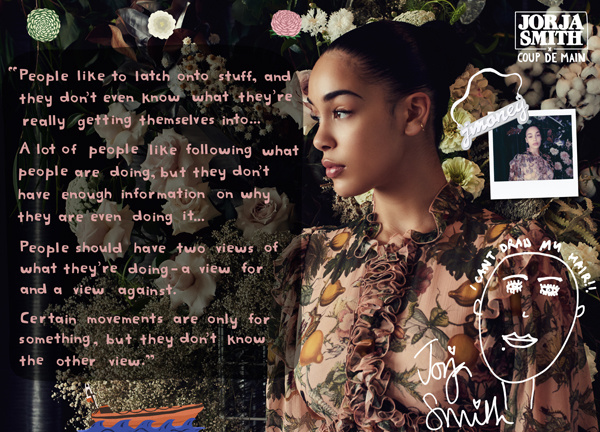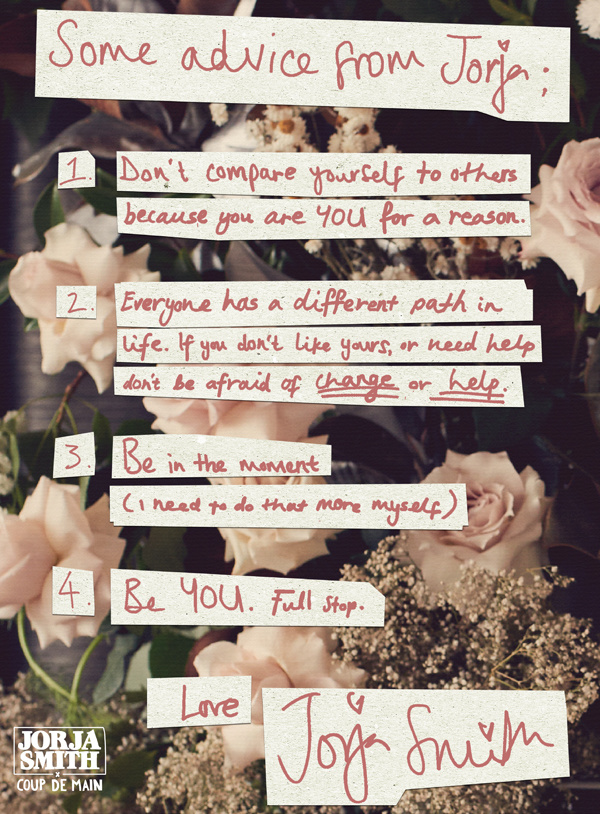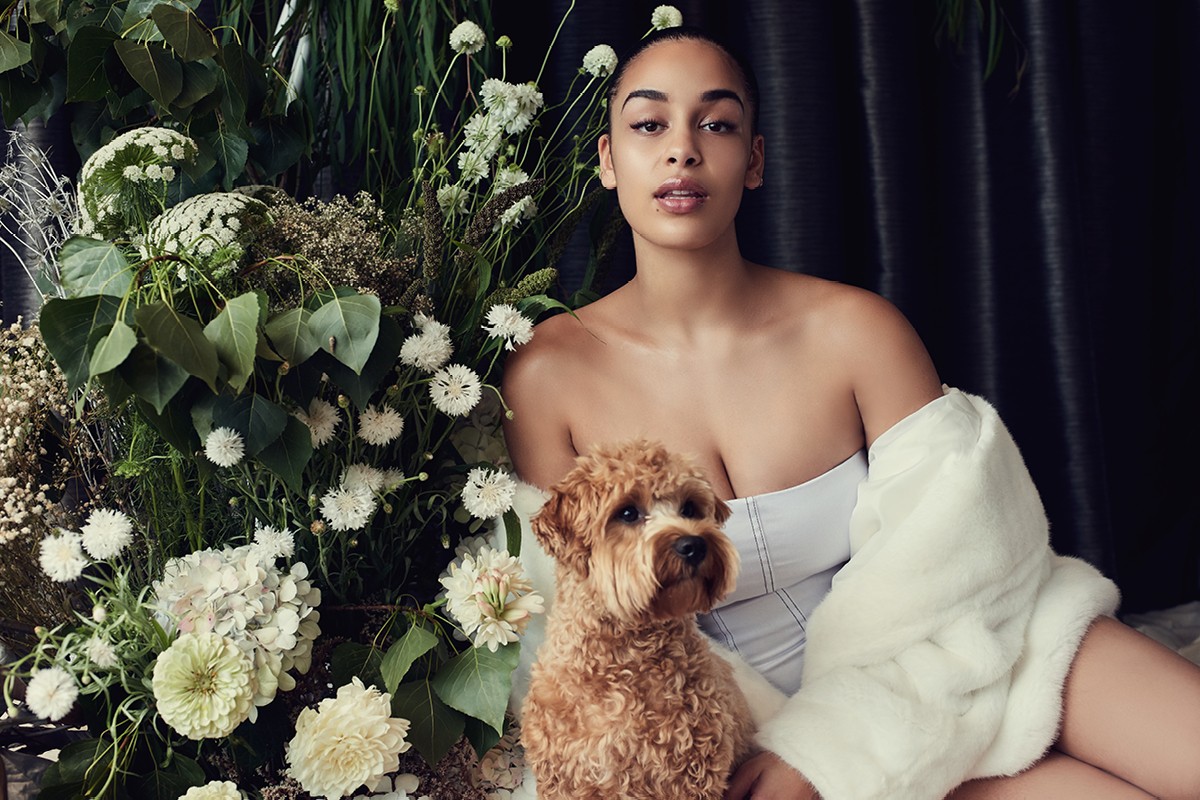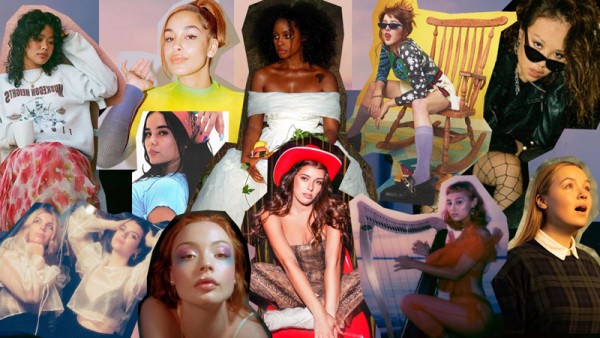Interview: Jorja Smith on feeling lost, found & everything else.

It’s the day before Laneway Festival in New Zealand, and Jorja Smith is in the middle of her Coup De Main covershoot. She takes a pause as she attempts to feed an 18-month-old puppy named Moses a blueberry, while fondly telling me that her own puppy, Ru, loves to snack on the fruit. Moses’ presence at the photoshoot has been the cause of much excitement for Smith (before his arrival, Smith had whispered aloud: "I hope he likes me!"), who had to leave Ru behind at home - but she tells me excitedly that soon Ru will be travelling everywhere with her, as she just got him a registered passport.
Making small talk while selecting outfits for the shoot, I tell Smith I’ve already seen some photos of her with fans in New Zealand since her arrival the day prior, who have captioned their posts on social media saying they want to marry her. “Everyone wants to be your wife, Jorja,” I tell her. She laughs and exclaims, “good,” satisfied in the knowledge that the population of New Zealand (both human and puppy alike) are besotted with her.

Click here to order a CDM x Jorja Smith zine (i.e. a mini-magazine featuring photos + quotes from this cover-story).
The following day marks Smith’s first ever New Zealand performance as part of the touring circuit that is Laneway Festival. Looking out into the enormous audience during her stunning sunset show, I spot a cardboard box that has been repurposed into a sign with the very important question, “JORJA, WILL YOU MARRY ME?” written across it in black sharpie. If I had any doubts about our country’s adoration of Smith, they’ve all but disappeared now.
For the twenty-one-year old, the past year has been a journey of growth, both as a person and for her career. She started out 2018 by taking home the Critics’ Choice Award at the Brit Awards, before going on to independently release her debut album ‘Lost & Found’ to much acclaim (including a Mercury Prize nomination), before ending the year with even more nominations, this time for Best New Artist at the Grammys and for two more Brits.
These impressive accolades speak for themselves, but as Smith wisely advises herself in ‘Teenage Fantasy’ (a song she wrote when she was just sixteen), “There's no need to rush, take your time / Life's a big old ride, sit back and enjoy the vibe.” When we meet Smith for the first time last August at her London apartment, she laughs when we discuss a different set of lyrics in that song [“I need to grow and find myself before I let somebody else love me / Because at the moment I don’t know me”], and admits that, “I don’t even follow my own advice!” It’s this honest, relatable demeanour that Smith exudes, whether she’s discussing a crush she once had on a “naughty boy” (who inspired ‘Teenage Fantasy’), or comparing our different nail designs, there’s a sincerity which makes every interaction with her feel like one with a childhood friend.

The warm sentiment around Smith’s success is echoed elsewhere in the music industry. Apple Music Beats 1 radio host Matt Wilkinson says of Smith’s success, "It’s quite admirable that she can get to this level on her own terms,” naming her a trendsetter in showcasing the ability of artists to truly lead their own careers in the industry today, helping to create a new landscape where signing to a major label is no longer a key stepping stone in reaching a certain level.
During that first interview in August, Smith told me she’s feeling found - but in New Zealand, many months later, she shares that she’s feeling lost (“because I’ve never been here before!” she explains). The two oppositional feelings are ones that she fluctuates between often, a self-awareness that bled into the themes of the album without even meaning to, as all of the twelve songs on ‘Lost & Found’ had been written before she’d even decided to make an album. Within the twelve songs you can find heartbreak, relatability, insight, romanticism, and an image of Smith’s life from the age of 16 to the present day — all of which she looks back on as just part of that journey.
It’s a journey that looks set to continue to soar in 2019, with two new collaborations already released: the first with Maverick Sabre on ‘Slow Down’, and the second with fellow Laneway alumnus Loyle Corner on ‘Loose Ends’, as well as another North American tour slated to begin in April, which will see her head out on the road with Kali Uchis, who she collaborated with last year on their duet ‘Tyrant’. Most recently, Smith celebrated International Women’s Day 2019 with an event held at London’s Boiler Room with Adwoa Aboah’s empowering Gurls Talk online community, where she performed with a number of fellow women. In a post on Instagram about the event, Smith said, “We constantly inspire each other to do more and try harder, love more, believe in yourself more,” which is a resolution she herself strives to achieve, whether it be through songs like ‘Beautiful Little Fools’ (an ode to finding beauty in one’s own individuality) that she released on last year’s International Women’s Day, or through her promotion of up-and-coming female musicians, such as Pip Millett. No matter what the rest of this year brings, it’s clear that Smith is here to stay, and she's here to flourish.

COUP DE MAIN: When we last hung out at your house in London in August last year, I remember you telling us that you were gonna buy a dog, and now you have a new puppy!! How is the new addition to your family?
JORJA SMITH: I miss him, because he couldn’t come to New Zealand! He has a passport so I’ll take him to America, but it’s a bit difficult over here. He’s really well behaved.
CDM: We saw you before you embarked on your US tour through November and December last year, and you were telling us that you were excited to be able to jam during soundcheck and maybe come up with some new musical ideas. Did that happen on that tour?
JORJA: We wrote one song. We jammed a little bit but it was a difficult one. I found that tour a bit difficult, because I was really tired. Last year was so busy so it all just came down to that tour, and I literally didn’t feel like my normal self. So no, I didn’t do much jamming.
CDM: What runs through your mind when you’re performing your songs live, especially ones that are based on things you’ve experienced?
JORJA: It depends. Sometimes they’re a bit nostalgic - they take me back. Or I’m just thinking about new things. Sometimes I’m thinking about random stuff when I’m singing.
CDM: You’re like, ‘I’m going to eat some blueberries after’?
JORJA: Uh-huh. ‘What shall I eat after?’ <laughs>
CDM: Have any songs from your album changed in feeling for you since you’ve been performing them?
JORJA: No, but I think I’ve changed or grown from the songs and from what I’ve written, definitely.
CDM: I guess you can look back on the album as a journey.
JORJA: Now I’ve grown up.

CDM: I saw you’ve been in the studio a little bit over the break too - is there anything in particular you’ve been writing about in those sessions?
JORJA: Yeah, that was nice. I came up with some new stuff, but I’ve been so tired. I work with my boyfriend a lot.
CDM: Did you have a proper break from everything as well?
JORJA: Yeah, I went home, got my dog. But it wasn’t really a break because… It was a break, but it didn’t feel like one as much. I needed more of a break from everything.
CDM: I feel like in creative fields it’s important to have a break from everything.
JORJA: Mmmhmm. Shut away from everything.
CDM: What do you think are essential ingredients in creativity, in your own experience? Are there certain feelings or things you have to surround yourself with?
JORJA: Normal, just your life, and how it goes - because you can’t predict that, and you can’t force things to be a type of way. Just life, and let whatever comes in your life happen, and go with it.
CDM: You wrote your first song when you were 11-years-old, so you’ve been writing now for ten years! Do you find that songwriting is something you have to do constantly to express yourself, or that it’s something you can leave and come back to?
JORJA: I’m always thinking about it. Because I’ve been on tour, I’ve been not writing as much, so I guess in that sense I’ve left it a bit. But I’m always singing, so always thinking too.

CDM: You talked with Complex about your songwriting process saying, "I used to write stories but I’d never finish them. I wrote poems...” Is story-writing something you still do? Does it become songwriting?
JORJA: With some songs I like stories because they’re based on half-truths and then I’ll write a song out of it, which is kind of fiction. <laughs>
CDM: So it starts with a base of truth?
JORJA: Yeah, sometimes. Or I exaggerate. I don’t really write stories, but I have written before when I have made up things, to talk about a certain scenario.
CDM: The lyrics in ‘Teenage Fantasy’ are so relatable, “I need to grow and find myself before I let somebody love me / Because at the moment I don’t know me.” Why do you think it’s important to know who you are as a person and love yourself as a person before letting somebody else in?
JORJA: I mean, I don’t even follow my own advice. <laughs> I think it’s definitely important to know yourself - but I feel like we’re constantly finding out about ourselves and we’re constantly growing. I’m not old enough to say if I will know myself, but I feel like we are constantly learning about ourselves. So I feel maybe just be more sure of yourself before you want someone else to know you, if you don’t know you. Some people know you better than you know yourself, which is really crazy.
CDM: In your album’s title track ‘Lost & Found’ you sing, "I’m in love with the thought of you," which is a really interesting sentiment because quite often people love with rose-tinted glasses or place their partner on a pedestal. Is it easier to be in love with the thought of someone, rather than reality, which is often more complicated?
JORJA: I wrote that song when I was sixteen, because this boy didn’t like me! I was obsessed with him. Yeah, I think so, because you can make things up in your head. You can make it out to be amazing, and then when it comes to it, even just your first impressions of what someone is going to be before you meet them or before you go on a date, you might be like, ‘They’re going to be amazing!’ and then you meet them and they’re just boring.
CDM: It’s the reality versus fantasy playing out.
JORJA: Exactly. That’s why you’ve got to find the right person, or you’ll just keep doing that and keep making things up in your head, and then you’re at home with someone who’s boring.


CDM: Similarly, in 'Teenage Fantasy' you explore similar themes of not being on the same page as your partner, and wanting what you can't have. Has pop culture conditioned us to long for a 'dramatic' love and wanting "someone, who we think is the one, just to fit in" as you say in that song?
JORJA: I think you used to at school. Everyone seemed to want a boyfriend, and no boys liked me. That’s why I wrote that song, because this boy I liked, he didn’t like me. He was a bit naughty, and all my friends were like, ‘You can’t like him, he’s naughty,’ and he didn’t even like me anyway. I think anything, films and TV, make you want a fairytale, but you just have to think realistically.
CDM: Are you feeling lost or found today? Last time we saw you, you were found - and you said that you often fluctuate between the two.
JORJA: Today, I’m lost in New Zealand - because I’ve never been here before.
CDM: Often when musicians first start out they remain independent, then end up signing to a major record label to release an eventual album. Is being independent something you find integral to part of your identity as a musician? It must also be nice for other up-and-coming musicians to see you as a role model in proving that major labels aren’t as important as they once were (especially as you were the first ever independent artist to be nominated, or win the Brit Critics Choice Award).
JORJA: I don’t know - I like what I’m doing now. I love my team and how everything is going how I want it to, so I don’t want to change anything at the moment.
CDM: It’s like, don’t try to fix something if it’s not broken!
JORJA: Why would I mess with it if it’s going really well?

CDM: It’s awesome that you released ‘Beautiful Little Fools’ on International Woman’s Day, and it’s such a strong empowering song. Why did you find female perceptions and expectations of beauty a theme that you wanted to explore in that song?
JORJA: I studied English Literature at school and I read ‘The Great Gatsby’, and that’s what inspired ‘Beautiful Little Fools’. I remember reading the quote, “I hope she'll be a fool - that's the best thing a girl can be in this world, a beautiful little fool." I was sitting there, and that quote just stuck with me. I was also thinking about how there wasn’t a song that I was listening to that made me feel good about myself, so I just wrote that.
CDM: And now it makes you feel good!
JORJA: Yes, and other little girls too. And not just other little girls, I know I’m saying that’s what girls are destined for, but people can listen to things and it can mean something to them.
CDM: Do you often find yourself inspired by things you read or films/TV that you watch?
JORJA: Yeah, anything inspires me. I could be walking down the road and see some people, and I’ll think of something. I do enjoy watching films too.
CDM: Is there anything you’ve been watching recently?
JORJA: No, I haven’t been watching any TV lately. What was the last thing I watched? I was watching some documentary on Netflix called ‘Afflicted’, and it’s about these new chronic illnesses. One woman is allergic to WiFi, her husband doesn’t believe her… She moves to this random place where people don’t have WiFi. It’s not inspiring me, but it’s interesting. It is quite good though! There’s one guy who hasn’t left his bed for two years, because any movement is too much for him.

CDM: In ‘Lifeboats’ (Freestyle)' you say, "If I saw somebody drowning in a sea of self-confusion / I wanna be the one to try and understand why their tide ain't coming in." Is there a societal tendency to look the other way when you see someone struggling?
JORJA: Yeah. Also, I feel like a lot of people have the mentality of, ‘Oh, someone else can help them.’ And if everyone thinks like that, then nobody’s going to help anybody. But yeah, I feel like a lot of people are like, ‘If I didn’t see it, it didn’t happen.’ But it is happening, right in front of you.
CDM: The lyrics of 'Lifeboats’ (Freestyle)' also remind me a lot of a play I saw in London called 'The Jungle', which is about the refugee crisis in Calais and really super heartbreaking. Your lyric, "We're too selfish in the lifeboats," really rings true about how I felt after watching the play - you feel really helpless, like you ought to be doing more to help others but you don’t know what to do. Do you think the herd mentality of, 'What can one person do to help? Someone else will do it instead,' is dangerous because then everyone just passes the 'lifeboat guilt' on?
JORJA: It is, but I feel like that with everything. People only do stuff when they see someone else doing it.
CDM: It’s a psychological thing, that if you see someone doing something you’re more likely to do so.
JORJA: People like to latch onto stuff, and they don’t even know what they’re really getting themselves into. I feel like a lot of people like following what people are doing, but they don’t have enough information on why they are even doing it. I feel like people should have two views of what they’re doing, a view for and a view against. Certain movements are only for something, but they don’t know the other view. I’m reading a book at the moment called ‘The Will To Change’ by bell hooks and it’s about the male patriarchal society. It looks at how young [boys are] told, “Don’t cry,” it’s interesting reading a different point of view.

CDM: ’Don't Watch Me Cry' is heartbreaking. I'm so, so sorry you went through that.
JORJA: I didn’t, I actually exaggerated, but I was really sad. Basically, it is true, everything I say in the song, but I wasn’t going out with anyone, but I just really liked this boy, and then he left and went to LA and I never saw him again. I was so sad, and I wrote this song and I felt so much better. It sounds like a really heartbreaking relationship, he told me not to wait for him, and I did for no reason.
CDM: Was that therapeutic for you to put your emotions into song-form?
JORJA: Yeah, or else I drive myself crazy. <laughs>
CDM: And now you can sing them for everyone.
JORJA: And everyone can sing with me too! That’s why I like writing, because it helps other people. If you’re going through the same things… That’s why I think it’s important with your lyrics, when the person presses play and then you say something, and they realise they’re not alone - you’re going through the same things.
CDM: 2019 is going to be such a big year for you - you’re nominated for Grammys, Brit Awards, and headlining your first music festival (Field Day!). What to you feels like success?
JORJA: Being happy.
CDM: Do you think the feeling of what success is will change?
JORJA: I don’t know. Maybe I’ll know when I’ve reached that point. Right now I’m happy and enjoying myself.
CDM: What part of being a musician do you get the most satisfaction out of?
JORJA: Writing, because I get to get everything off my chest.

CDM: It was really cool to see you bring out so many different musicians at your Brixton Academy show last October too! Did you enjoy working with other people in that capacity?
JORJA: Yeah! I like performing by myself and I love my band, but it’s nice to have different guests sometimes, and share the stage with people. It’s fun, it makes it different.
CDM: We are so excited that you’ve collaborated with Loyle Carner on ‘Loose Ends’ - how did that song come about?
JORJA: It was written by him and Jordan Rakei, but they wrote it with me singing it in mind. I heard it and I was like, ‘This is so beautiful,’ so I sang it. I got into the studio and sang it, I really liked it.


Jorja Smith's debut album 'Lost & Found' is out now.
Watch the music video for 'The One' below...







